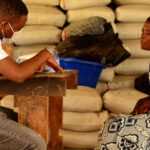The Abortion-related Morbidity and Mortality in Fragile and Conflict-affected Settings (AMoCo) study is a multi-year research project to assess the magnitude and severity of abortion-related complications in hospitals located in fragile or conflict-affected areas of the Democratic Republic of the Congo (DRC), the Central African Republic (CAR) and Nigeria.


Around the world, recognition is growing that climate justice and reproductive justice are inextricably linked—and that effective solutions to the climate crisis require a focus on women’s rights and needs. Yet philanthropic support is lagging: Only 0.01% of global funding goes to projects that tackle both climate and women’s rights.


